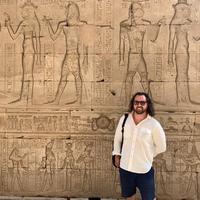Dissertation by Mark F Johnson
Doctoral dissertation (University of Toronto), 1990
My general take on how Thomas Aquinas both describes and does theology: as a wisdom, which requir... more My general take on how Thomas Aquinas both describes and does theology: as a wisdom, which requires the theologian to study the articles of faith, their interconnection, and the very terms and notions of which these articles are comprised. If the articles of faith are attacked, who you gonna call? The Theologian.
Articles by Mark F Johnson
Recherches de Théologie et Philosophie Médiévales, 2000
A paper I wrote back in the year 2000—so long ago. I believe that there is an article out there b... more A paper I wrote back in the year 2000—so long ago. I believe that there is an article out there by Norman Kretzmann on the same topic. It seems to have stood the test of time.

Medieval Philosophy and Theology 2 (1992) 118-42, 1992
There has been no unanimity among interpreters of St. Thomas Aquinas as to whether he held a doct... more There has been no unanimity among interpreters of St. Thomas Aquinas as to whether he held a doctrine of the plurality of the literal sense of Scripture, and the chief reason for this diversity of modem opinion lies in the few texts in which Thomas broaches the subject. While at first glance suggesting a doctrine of plurality, these texts have not been thought to state it with a clarity that puts the matter beyond all doubt; scholars who have denied that Thomas held the doctrine have felt free to interpret his texts by other means, such as by his doctrine of theology's basis in the literal sense, or of the inner and outer word.l 1. Those who have denied that Thomas held a doctrine of plurality include the following: Paul Synave, "La doctrine des. Thomas d'Aquin sur le sens Iitteral des Ecritures," Revue Biblique 35 (1926): 40-65; Synave, note in Bulletin Thomiste 3 (1930-1933): 711-718; J.-M. Voste, Revue Biblique 36 (1927): 112; Ceslao Spicq, note in Revue des sciences philosophiques et theologiques 20 (1931): 331; Spicq, Esquisse d'une histoire de l'ex~g~se latine au moyen iige, BT 26 (Paris: J. Vrin, 1944), pp. 276-279; N. Assouad, France Franciscaine 13 (1930): 409-504; G. Parella, "II pensiero de s. Agostino e s. Tommaso circa il numero del senso letterale nella S. Scritture,"
St Thomas, Obediential Potency, and the Infused Virtues: De virtutibus in communi, a. 10, ad 13, 1995
The Linacre Quarterly, 1993
Note the mis-attribution to a "Mark A. Johnson." At that time I simply went by "Mark Johnson," on... more Note the mis-attribution to a "Mark A. Johnson." At that time I simply went by "Mark Johnson," only later to add my middle initial, at the recommendation of Michael Fahey, SJ, such that now I go by "Mark F. Johnson" in academic publishing.
The New Scholasticism 63 (1989): 129-55, 1989
Back in the 1980's I was a River Forest Thomist, eager to show that Thomas's debt to Aristotle on... more Back in the 1980's I was a River Forest Thomist, eager to show that Thomas's debt to Aristotle on fundamental metaphysical issues was deep. And what's more deep than creation?
My first article, back in 1989! Thanks, forever, Ralph McInerny. Here I take issue with John F.X.... more My first article, back in 1989! Thanks, forever, Ralph McInerny. Here I take issue with John F.X. Knasas, a strong supporter of the existential Thomism of Etienne Gilson and Joseph Owens. Knasas's desire to sequester Thomas away from allowing the discipline of natural philosophy to arrive at a fully immaterial reality through its proper demonstrative methods seemed to me to be at odds with Thomas's text.
A short article, presented at a conference in Bologna in 2005. The general topic was medieval Dom... more A short article, presented at a conference in Bologna in 2005. The general topic was medieval Dominican education at the Bologna stadium at San Domenico.
Book chapters by Mark F Johnson
Studies in Thomistic Theology, 1996
“The Theological Character of Aquinas’s Five Ways,” in Studies in Thomistic Theology, ed. Paul Lo... more “The Theological Character of Aquinas’s Five Ways,” in Studies in Thomistic Theology, ed. Paul Lockey (Notre Dame: University of Notre Dame Press, 1996). Pp. 137–173. Looking back, I'd tone things down, though the idea of 'what the name 'God' means' still feels right to me.
An introduction I wrote in 2007 to a volume of English translations of St. Thomas Aquinas's three... more An introduction I wrote in 2007 to a volume of English translations of St. Thomas Aquinas's three ventures into the Mendicant controversies at the University of Paris. The book that this was written for went nowhere, but maybe the introduction (entirely derivative scholarship, as these things tend to be) will be useful.
Unpublished papers by Mark F Johnson
This is paper from my graduate school days that has had chunks of it published, but which I never... more This is paper from my graduate school days that has had chunks of it published, but which I never did develop fully—nor do I think I ever shall. It is useful for getting a sense on how the notion 'obediential potency' was used in Thomas's day, however, and visits key moments in Thomas's writing that illustrate how he applies the notion in his teaching.
Oh, the paper was written for Fr Walter Principe, who had no love for the notion of obediential potency; but he did say to me that I had started to change his mind. . .











Uploads
Dissertation by Mark F Johnson
Articles by Mark F Johnson
Book chapters by Mark F Johnson
Unpublished papers by Mark F Johnson
Oh, the paper was written for Fr Walter Principe, who had no love for the notion of obediential potency; but he did say to me that I had started to change his mind. . .
Oh, the paper was written for Fr Walter Principe, who had no love for the notion of obediential potency; but he did say to me that I had started to change his mind. . .